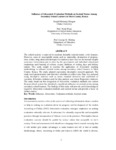| dc.description.abstract | The school system is expected to inculcate desirable societal norms in the learners. However, cases of unacceptable norms such as immorality, destruction of property, riots, strikes, drug abuse and disrespect for authority have been on the increase despite numerous interventions put in place by the government and individual educational institutions such burning of external exams, abolition of visiting days and holiday tuition. This study sought to examine the application of Afrocentric teaching methodology to enhance societal norms among secondary school learners in Meru County, Kenya. The study adopted exploratory descriptive research approach. The study used questionnaires and interview schedules to collect data. Data was analyzed using descriptive statistics such as mean, standard deviation and coefficient of variation. Inferential statistics used for data analysis was Linear Regression Analysis. The study found out that integration of Afrocentric evaluation methods into current Kenyan school system has statistically significant influence on societal norms among secondary school learners. The findings of this study will provide useful knowledge in regard to Afrocentric evaluation methods and societal norms and provide a basis for further studies. | en_US |

